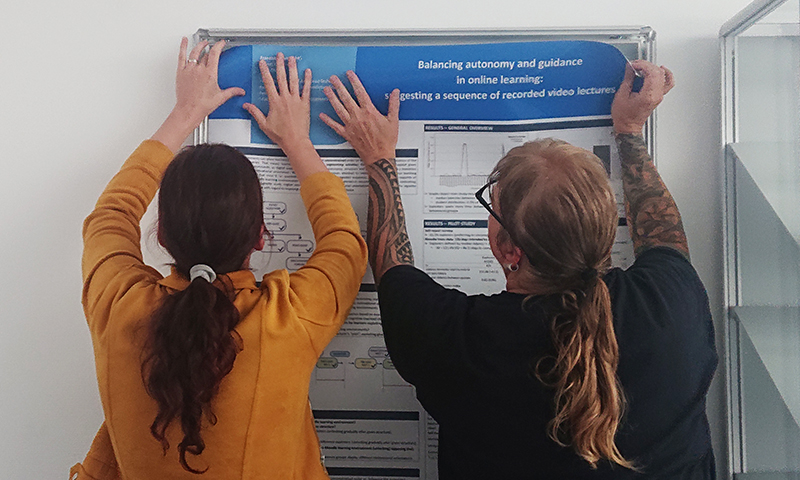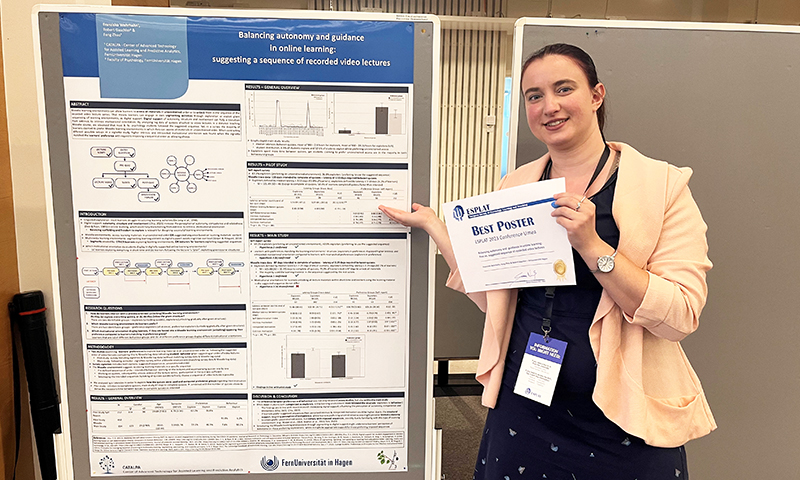News
Framing for the best posters
[31.08.2023]Making good research visible - that is what CATALPA has set out to do. And framing it in the literal sense, too: As of now, the research center is exhibiting a small sample of it - namely, posters that have been awarded a prize. The first poster is by Franziska Wehrhahn. For her work on "Balancing autonomy and guidance in online learning" with Robert Gaschler and Fang Zhao, she received the "Best Poster Prize" at the ESPLAT educational psychology conference in Umeå, Sweden.
 Photo: CATALPA
Photo: CATALPA
"My work is about sustainability in teaching and learning," Franziska Wehrhahn explains. "We know quite a bit about how learning works efficiently. Yet, that does not necessarily coincide with what learners like - or how they behave." For her dissertation in the Junior Research Group Multimedia, she took a closer look at learning in Moodle courses: She studied preferences, behavior, and motivation of psychology students in an introductory B. Sc. course. The course combines quizzes and video lectures. The course sequence is clearly structured - students must complete a final quiz for each subtopic to unlock the next topic’s material. But does this strict guidance really make sense?
Autonomy or structure in the learning environment
In her two-stage study, Franziska Wehrhahn first identified two groups of learners: "explorers" and "exploiters" - students who want to explore and discover their learning environment as autonomously as possible on their own, and those who appreciate a predetermined structure to follow. "I also took a closer look at learners' motivation and self-regulation," she explains.
 Photo: CATALPA
Photo: CATALPA
Franziska Wehrhahn investigated with a survey who would prefer exploration or exploitation. The result: the ratio was about 60:40, with the "explorers" clearly in the majority. The structured sequence of the course, on the other hand, corresponded more to the preferences of the "exploiters", i.e., the smaller group. The researcher also used another survey to determine the motivation of the learners. She found that students were more motivated when preference and learning environment matched. "Psychologically, this can be explained by the fact that students experience themselves as competent in this structured environment," explains Franziska Wehrhahn. On the other hand, those who tend to strive for autonomy in their behavior, like the "explorers", presumably feel more restricted by the specifications.
Theory, surveys and Moodle data
"It is interesting that most students nevertheless adhere to the course structure," says Franziska Wehrhahn. Because technically it would have been possible to sabotage the predefined structure and, for example, finish all quizzes quickly without passing them or without having watched the video lectures. "But very few people do that. More than 90 percent follow the structure." Still, differences in the behavior of the two groups are apparent: analysis of Moodle data showed that the "explorers" take on average less time between assignments than the "exploiters".
At the ESPLAT conference in Sweden, Franziska Wehrhahn's research was met with great interest because it combines theoretical perspective, surveys, and the documentation of behavior. "Being able to discuss my work in such a specific way really helped me move forward," she says. She was still surprised about the award. "The judges evaluated the poster itself combined with its presentation," she says. "The acknowledgement of my work means a lot to me."
In the Philipp Reis Building
Anyone who would like to visit the "CATALPA Hall of Fame" and take a look at Franziska Wehrhahn's poster will find it in the stairwell of the Philipp Reis Building on the 1st floor. The latest award-winning CATALPA posters will be on display here in rotation.

